Podcast: Play in new window | Download | Embed
 This episode I responded to Chris Steinle on his root fallacy of the Greek word harpagēsometha in the rapture passage 1 Thess 4:17. I explained the phonological dynamics behind the lexical form of the Greek word harpazō and its form harpagēsometha. When certain letters interact with each other you get a variety of changes. Lexicographers recognize this. But you do not discern a word’s meaning based on its root. Meaning is based on usage. Is the Meaning of Harpagēsometha in 1 Thess 4:17 ‘Rapture’ or ‘Plunder’? Part 4 – Ep. 117
This episode I responded to Chris Steinle on his root fallacy of the Greek word harpagēsometha in the rapture passage 1 Thess 4:17. I explained the phonological dynamics behind the lexical form of the Greek word harpazō and its form harpagēsometha. When certain letters interact with each other you get a variety of changes. Lexicographers recognize this. But you do not discern a word’s meaning based on its root. Meaning is based on usage. Is the Meaning of Harpagēsometha in 1 Thess 4:17 ‘Rapture’ or ‘Plunder’? Part 4 – Ep. 117
“For the Lord himself will come down from heaven with a shout of command, with the voice of the archangel, and with the trumpet of God, and the dead in Christ will rise first. Then we who are alive, who are left, will be suddenly caught up [harpagēsometha] together with them in the clouds to meet the Lord in the air. And so we will always be with the Lord.” (1 Thess 4:16-17)
LINKS MENTIONED IN THE PROGRAM:
Is the Meaning of Harpagēsometha in 1 Thess 4:17 ‘Rapture’ or ‘Plunder’? Part 1 – Ep. 114
Is the Meaning of Harpagēsometha in 1 Thess 4:17 ‘Rapture’ or ‘Plunder’? Part 2 – Ep. 115
Is the Meaning of Harpagēsometha in 1 Thess 4:17 ‘Rapture’ or ‘Plunder’? Part 3 – Ep. 116


